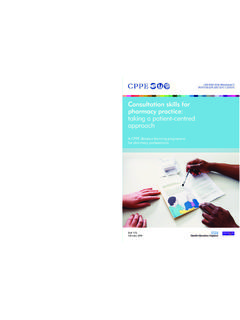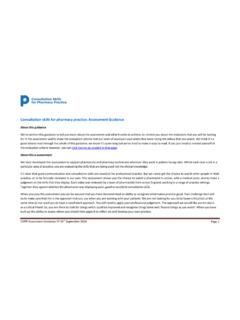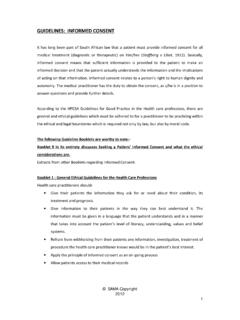Transcription of Consultation skills for pharmacy practice: practice ...
1 1 Consultation skills for pharmacy practice : practice standards for England For all pharmacy professionals March, 2014 Developed by Endorsed by 2 Foreword These practice standards have been prepared as part of the Modernising pharmacy Careers (MPC) programme to define the knowledge, skills , behaviours and attitudes that pharmacy professionals should be able to demonstrate when communicating and consulting with patients. Although primarily aimed for the start of a career as a pharmacy professional , they are also intended to guide pharmacy professionals in their early careers and beyond. The document is one part of a framework being developed to support the professional development of pharmacists and pharmacy technicians in the areas of medicines optimisation and public health.
2 It follows the same style as the framework used by the Royal College of General Practitioners (RCGP) for its GP curriculum and in particular, the contextual statement on the GP Consultation in practice . We hope that you will find these standards helpful in the development of your Consultation skills , enabling you to provide high quality services and patient-centred care. We would like to thank the task and finish group who led the development of these standards, the Modernising pharmacy Careers team at Health Education England and Lesley Grimes, senior pharmacist, learning development, CPPE for their contributions. Christopher Cutts Professor of professional Development and practice Director, Centre for pharmacy Postgraduate Education Associate Dean for External Relations, Faculty of Medical and Human Sciences Centre for pharmacy Postgraduate Education Manchester pharmacy School Clare Howard Deputy Chief Pharmaceutical Officer, NHS England Co-chairs, Consultation and Communication skills Task and Finish Group 3 Acknowledgements This document follows the same style as the framework used by the Royal College of General Practitioners (RCGP)
3 For its GP curriculum and in particular, the contextual statement on the GP Consultation in practice , part of the RCGP curriculum for 2010 (used with permission). In addition to the RCGP curriculum, the practice standards were developed with reference to various frameworks and guidelines including: The medication-related Consultation framework A reflective tool to support the development of Consultation skills for pharmacy practitioners. Abdel Tawab R, James DH, Fichtinger A, Clatworthy J, Horne R, Davies G (2011). Development and validation of the medication-related Consultation framework (MRCF) Patient Education & Counseling 83 (3): 451-7. A single competency framework for all prescribers National Prescribing Centre: May 2012 Medicines adherence: NICE clinical guideline 76 January 2009 Foundation pharmacy Framework: a framework for professional development in foundation practice across pharmacy Royal Pharmaceutical Society 2014 (The standards link to cluster 1 of the framework, Patient and Pharmaceutical Care.)
4 4 Task and finish group Reena Barai, local pharmacy tutor, South West London, CPPE Nina Barnett, consultant pharmacist, Older People, Northwick Park Hospital, East and South East England Specialist pharmacy services NHS Gill Bullock, training and development manager, Dean & Smedley Ltd Christine Burbage, superintendent pharmacist, Superdrug Stores plc Alastair Buxton, head of NHS services , PSNC Catherine Davies, education officer, APTUK James Desborough, lecturer in pharmacy practice , School of pharmacy , University of East Anglia Dr Catherine Duggan, director of professional development and support, Royal Pharmaceutical Society Liz Fidler, educational and practice supervision specialist, pharmacy , Health Education Kent Surrey and Sussex.
5 Chair of NHS PEDC Support Staff Subgroup Lesley Grimes, senior pharmacist, learning development CPPE Rob Horne, professor of behavioural medicine, director, Centre for Behavioural Medicine, UCL School of pharmacy , University College London & UCL Academic Lead, Centre for Advancement of Sustainable Medical Innovation (CASMI) Sandra Hutchinson, group L&D manager, Rowlands Delyth James, senior lecturer, programme director, MSc in pharmacy Clinical practice (Community & Primary Care), Cardiff School of pharmacy and Pharmaceutical Sciences Barry Jubraj, lead pharmacist for Academic Studies & professional Development, Chelsea & Westminster Hospital NHS Foundation Trust Yousuf Khan, recently registered pharmacist Harriet Lewis, ABPI regional partnership manager Raminder Sihota, head of pharmacy & healthcare learning & development, Boots Liz Stafford, Royal Pharmaceutical Society representative Sneha Varia, pharmacy professional development specialist, London pharmacy Education & Training Ruth Wakeman, head of professional support, Royal Pharmaceutical Society Ellen Williams, regional education and training specialist pharmacy technician.
6 University Hospitals Bristol NHS Foundation Trust Kurt Wilson, general practitioner Project support Kellie Espie-Whitburn, Modernising pharmacy Careers Team, Health Education England Janet Flint, Modernising pharmacy Careers Team, Health Education England Lesley Grimes, senior pharmacist, learning development, CPPE 5 Structure of the standards The practice standards have been developed around the following areas: 1. The management of patient-centred consultations a) Organisational and management skills b) Key Consultation skills and behaviours, including those relating to health coaching and taking a patient-centred approach 2. Context-specific skills 3. Delivering a comprehensive approach to patient care 4.
7 Understanding the health needs of your local population 5. The essential features that relate to you as a pharmacy professional 6 Areas of competence 1 Management of patient-centred consultations This area of competence is about how you communicate and manage your consultations with patients. The competencies relate to the organisational and management skills and the key skills typically associated with good communication between pharmacy professionals and patients, which are needed to ensure patient consultations are delivered efficiently and effectively. It further builds on these skills by including specific competencies that relate to the context of taking a patient-centred approach and health coaching (see below for details), treating your patients as individuals, and working in partnership with them.
8 It centres on the competencies required when entering into shared decision making with patients, while considering the patient s own values, beliefs and expectations. Patients should be put at the centre of their own healthcare and although you, the pharmacy professional , are the expert in medicines, the patient is also an expert within the Consultation with respect to their health and social situation. It is important to view the patient holistically and consider the big picture of internal and external factors that may influence adherence to a management plan. This means understanding and respecting the values, culture, family structure and beliefs of your patients, and understanding the ways in which these will affect the experience and management of their health issues and the way in which they take their medicines.
9 A) Organisational and management skills This means that as a pharmacy professional you are expected to: Undertake the Consultation in a supportive environment, taking account of safety, comfort, confidentiality, dignity and respect Be able to describe common Consultation models relevant to the pharmacy profession and demonstrate how you can apply these models in practice Use patient medication records, and clinical records, when available, effectively as part of the Consultation Use time and resources efficiently and effectively Recognise the roles of health and social care colleagues and draw on this expertise appropriately Use skill mix appropriately to facilitate the administrative tasks associated with the Consultation Achieve meaningful consent and agreement to a management plan 7 Document a full history from the patient of their medication or any public health issues discussed Keep accurate, legible and contemporaneous records to document the Consultation .
10 B) Key Consultation skills and behaviours, including those relating to health coaching and taking a patient-centred approach. Coaching as a general concept helps people to set goals and identify ways of achieving them. Pharmacists have the relevant knowledge relating to medicines and health and wellbeing to provide the patient with the information they need, but can also use a coaching approach to give patients ownership of their own health goals. The coaching approach is based on evidence that taking a collaborative approach with the patient will increase the likelihood of behavioural This means that as a pharmacy professional you are expected to: Set the scene of the Consultation professionally and appropriately while building rapport with the patient Hear and acknowledge the patient s agenda without interrupting and further balance with your own agenda before negotiating a shared agenda Communicate positively and effectively throughout the session, using language that is appropriate and respectful to the patient (non-technical, non-jargon)



